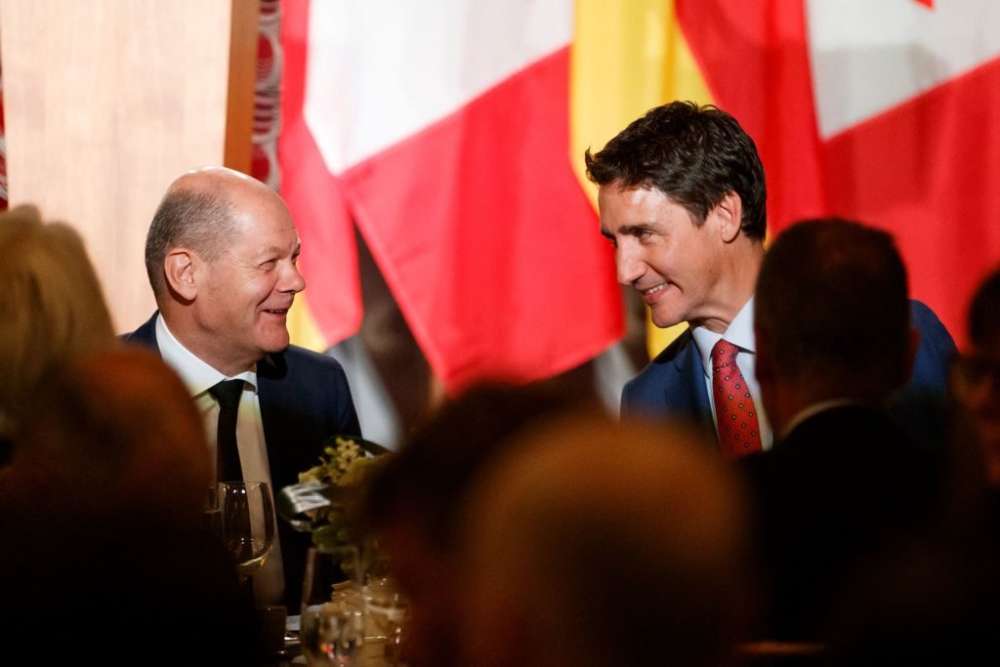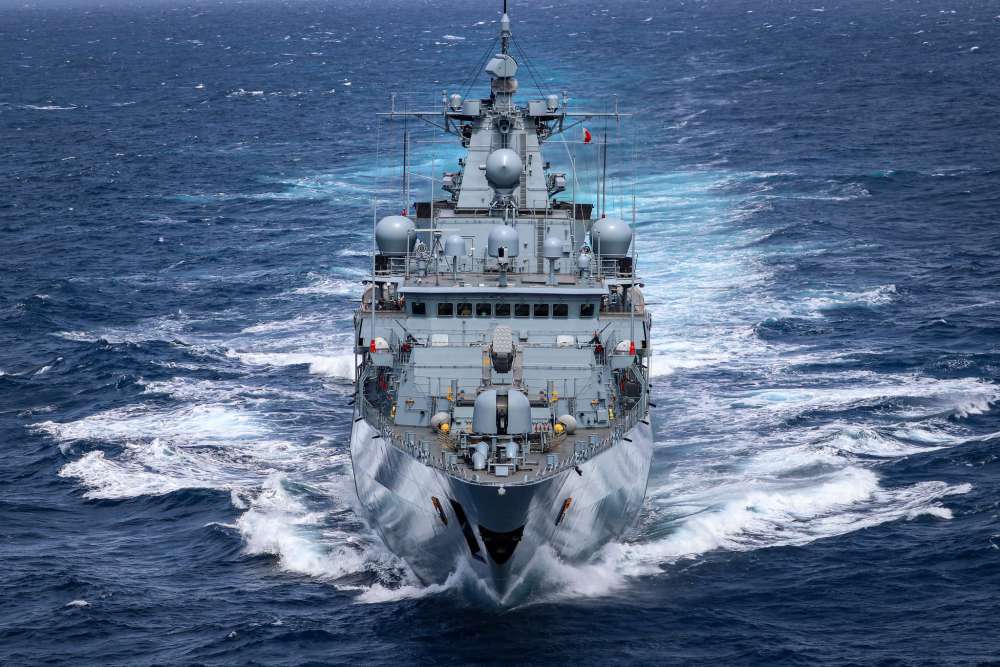Canada and Germany: Partners in Defending a Shared Approach to International Security

(Cole Burston /Getty Images)
With militarized nationalism and anti-internationalist sentiments on the rise again, Canada and Germany should work together to forge a more effective and inclusive multilateral system – one built on democratic solidarity.
National security strategies habitually begin with a focus on military threats and hence with the realities and vulnerabilities that come with geography. From that perspective alone, Canada’s national security does not link intuitively to that of Germany, even though Canada sent more than a million men and women to serve in the murderous European wars of the twentieth century. But the appalling costs of exactly those wars also made it a strategic imperative for both countries to look beyond ‘classic’ threats of geographic adjacency when contemplating their security, and to factor in the larger strategic goal of defending inviolable global security norms. Though the solemn vow that the First World War would be the “war to end all wars” failed against the rise of militarized nationalism, a renewed pledge of “Never again” emerged from the ashes of the calamitous 1939 – 45 war. Both post-war Canada and Germany became deeply vested in a global security system built to finally make wars of aggression strictly “history.”
Post-war Germany’s transatlantic vocation increasingly included an emphasis on internationalist like-mindedness with “the other North America,” for example within Canada’s strategic partnership with the European Union and the two countries’ roles as NATO allies. The end of the Cold War, then, encouraged Canada and a newly reunified Germany to act as protagonists for a more effective and inclusive rules-based multilateral system built on international cooperation. As a result, and to this day, they share a paradigm of national security that has given more and more weight to the dimensions of human, economic, energy, health and climate security. It is rooted in the recognition that the most pressing global threats require shared solutions.
» Canada and Germany share a paradigm of national security that is rooted in the recognition that the most pressing global threats require shared solutions. «
Important Signals
Canada and Germany should now work together to adapt this paradigm for a world in which militarized nationalism and anti-internationalist sentiments are on the rise again. Russia’s attempt to extinguish Ukraine’s burgeoning democracy through military force and occupation threatens to obliterate many of the hard-won norms that were established more than seventy-five years ago. The very destructive war of attrition in Ukraine, which has no end in sight, is disrupting global energy and food markets and thus adds to the burdens carried by the most vulnerable in a world that is already struggling to cope with the effects of climate change, an ongoing pandemic and other challenges. All of this makes stronger cooperation between Ottawa and Berlin more urgent than ever.
In light of this, a recent series of high-level diplomatic meetings that culminated in a joint visit by German Chancellor Olaf Scholz and German Vice Chancellor Robert Habeck to Canada in August 2022 sent important signals. In addition to making plans to intensify the two countries’ bilateral energy cooperation to provide Germany with alternative sources of energy in the coming years, Canadian and German leaders also jointly recognized that it is vital to curb Russia’s attempt to resurrect the dictum that “might makes right.” In discussing how the two countries can help reinforce the broad-based but largely Western coalition against Moscow’s aggression, they also stressed the inevitable necessity that all NATO members build back cooperative defense systems against what is likely to be an enduring threat from a hostile Russia.
Key Points:
- Russia’s war of aggression against Ukraine threatens bedrock international principles that serve to curtail the imperialist ambitions of militarized nationalism.
- Canada and Germany should jointly lead the global effort to strengthen the defense of democracy and human rights, and to protect the norms of rule-based multilateralism.
- Berlin and Ottawa should also commit to the strategic objective of building back confidence in a system of multilateral cooperation that works in the interest of all.
Forging Democratic Solidarity
The immediate imperative to defend Ukraine’s very existence is also one to defend bedrock international principles that serve to curtail the imperialist ambitions of militarized nationalism. Thus, it is important that the rest of the world not see the Ukraine conflict only through the prism of competition between “the West” and a truculent Russian disruptor. Russia threatens a vital global norm meant to protect every state’s national sovereignty against armed incursion. And yet, while few countries in the United Nations actively defended Russia, many in the UN’s “silent majority” sat on their hands when it came to sanctioning the clear aggressor in this war.
» Many states have grown skeptical of US and European governments that have all too often failed to act on principles of global solidarity. The multilateral system has been failing to meet vital stress tests. «
One reason is that many states are too preoccupied with current financial and other strains. Another is that they have grown skeptical of US and European governments that have all too often failed to act on principles of global solidarity. In consequence, the multilateral system has been failing to meet vital stress tests. The COVID-19 pandemic, for example, took far more lives than it would have had the Global North shown more solidarity in distributing vaccines around the world. Global corruption thrives because Western financial hubs facilitate the laundering of ill-gotten gains. And many countries in the Global South decry that the West fails to show global solidarity in the fight against the climate crisis.
Such failures should impel Canada and Germany to jointly forge deeper internationalist solidarity around these issues. Fortunately, a number of actors on both sides are already working together toward this goal. Ground-breaking discussions between the Canadian and German foreign ministers in 2017 focused on the need for like-minded pluralist and federalist democracies like Canada and Germany to strengthen the defense of democracy and human rights, and to protect the norms of rule-based multilateralism against an accelerating competitive nationalism (including of the kind seen in the US under President Donald Trump between 2017 and 2021).
A Multilateral System that Works for All
A growing network of German and Canadian officials, scholars, and civil society and thought leaders has been exploring how mutual learning can build solidarity, including at the global level. It aims to engage especially democracies from all parts of the world in a purposeful dialogue to re-build international confidence in democratic solutions to contemporary problems – and to thereby reinforce the belief in the merits of multilateral cooperation itself.
» The imperative of meeting urgent crises and challenges together must be accompanied by a parallel commitment to the strategic objective of building back confidence in a system of multilateral cooperation that works in the interest of all. «
Led by the Canadian International Council, the German Konrad Adenauer Foundation and the Global Public Policy Institute in Berlin, this civil society network that has grown to include partners in South Korea, India, South Africa, Brazil, and the Caribbean emphasizes the principle of mutual learning. In an increasingly polarized world in which the West no longer dominates, it is time for our democracies to lead in reaching out to additional partners in Asia, Latin America and Africa to build – jointly and in mutual respect – the foundations for a fairer, more stable and more effective global order.
This imperative of meeting urgent crises and challenges together must be accompanied by a parallel commitment to the strategic objective of building back confidence in a system of multilateral cooperation that works in the interest of all. Only then can we once more secure the rule of law for our planet.
Jeremy Kinsman
Distinguished Fellow, Canadian International Council
Ben Rowswell
President, Canadian International Council
Weiterlesen

Don’t Stumble at the Start Line: Lessons from the UK’s Integrated Review
The United Kingdom’s Integrated Review in 2020 was supposed to be the most substantial security overview in decades. But its bold ambitions were undermined by missteps ahead of the document’s release. Why this should be a cautionary tale for Germany.

Bringing the Indo-Pacific into Germany’s Security Strategy
Germany’s first-ever national security strategy represents an opportunity to re-examine how Germany sees the world – not just the developments in Europe, but also those in the Indo-Pacific.

It’s the Politics, Stupid: Lessons for Germany from US Security Strategies
A successful national security strategy needs a solid political foundation. In democracies, that foundation – for better or worse – rests on the electoral process and the political leaders it produces.